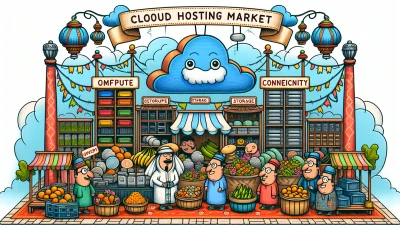What is reseller hosting Quiz
Test Your Knowledge
Question of
What is Reseller Hosting?
Reseller hosting is a form of web hosting wherein the account owner has the ability to use their allotted hard drive space and bandwidth to host websites on behalf of third parties. Essentially, the reseller purchases the host's services wholesale and then sells them to customers, possibly for a profit. This type of hosting is beneficial for individuals or companies looking to start their own web hosting business without having to invest in expensive infrastructure, as they can simply rent server space from a larger host and then act as a middleman. It's also used by web designers and developers who want to offer hosting services to their clients as part of a package deal.
How Does Reseller Hosting Work?
Reseller hosting involves purchasing hosting services from a primary provider and then selling them to clients, essentially acting as a middleman. This setup allows individuals or businesses to offer hosting services without having to own, operate, or manage servers directly. Typically, the reseller purchases a bulk hosting plan, which they can then divide and sell in customized packages to suit the needs of their clients. This model benefits both the reseller, who can brand the service as their own and manage their pricing structure, and the end-users, who receive hosting services tailored to their specific needs. Resellers are responsible for providing customer support to their clients, while the original hosting provider maintains and updates the server infrastructure.
Benefits of Reseller Hosting
- Cost-Effective Startup
- Revenue Generation Opportunities
- Flexibility to Set Your Own Pricing
- No Need for Technical Knowledge
- Brand Building Potential
- Scalability
- Focus on Customer Service
- Multiple Revenue Streams
- Customization and Control
- Access to Various Features and Tools
Drawbacks of Reseller Hosting
- Limited Control: Resellers often have limited control over server resources and configurations.
- Dependence on the Parent Hosting Provider: The quality of service is largely dependent on the parent hosting provider's reliability and performance.
- Responsibility for Technical Issues: Resellers are usually responsible for their customers' technical support, which can be challenging without the appropriate technical expertise.
- Potential for Overselling: There is a risk of overselling bandwidth and storage if not properly managed, leading to performance issues.
- Competition: High competition in the hosting market can make it difficult to stand out and attract customers.
- Costs: Initial and ongoing costs for purchasing and maintaining reseller packages can be high, especially for premium services.
- Branding Limitations: Some reseller hosting plans may have limitations on branding options, making it difficult to establish your brand.
Who Should Consider Reseller Hosting?
Reseller hosting is an ideal solution for several types of users. Firstly, web designers and developers who build websites for their clients can benefit from reseller hosting by offering it as an additional service, thereby creating a new revenue stream. Entrepreneurs looking to enter the web hosting business without the high costs of setting up and managing their own servers can also benefit significantly. Additionally, individuals or businesses with multiple websites can find reseller hosting cost-effective and convenient, as it allows for easier management of all sites under one account. Lastly, IT consultants or agencies that manage IT infrastructure for their clients can add web hosting to their portfolio of services, providing a more comprehensive package to their customers.
How to Choose a Reseller Hosting Provider
Choosing the right reseller hosting provider is critical for the success of your hosting business. Start by evaluating the reliability and performance of the provider; uptime guarantees and server speed are key metrics to consider. Look for providers that offer scalable solutions, allowing you to easily upgrade your plan as your business grows. Customer support is another crucial factor; ensure that the provider offers 24/7 support with a variety of contact methods. Additionally, compare the features and tools provided for managing your hosting business, such as billing software and control panels. Finally, consider the cost and ensure it aligns with your budget and business model. By carefully assessing these aspects, you can select a reseller hosting provider that meets your needs and supports your business goals.
Comparison of Top Reseller Hosting Providers
| Provider | Starting Price | Storage | Bandwidth | cPanel Accounts | Free SSL |
|---|---|---|---|---|---|
| HostGator | $19.95/mo | 60 GB | 600 GB | Unlimited | Yes |
| SiteGround | $42.00/mo | 40 GB | Unmetered | Unlimited | Yes |
| A2 Hosting | $18.99/mo | 30 GB | 400 GB | 40 | Yes |
| InMotion Hosting | $15.39/mo | 80 GB | 800 GB | 25 | Yes |
| Bluehost | $18.99/mo | Unlimited | Unmetered | Unlimited | Yes |












